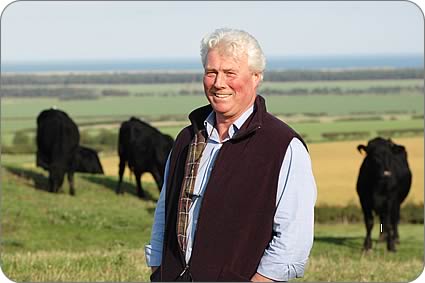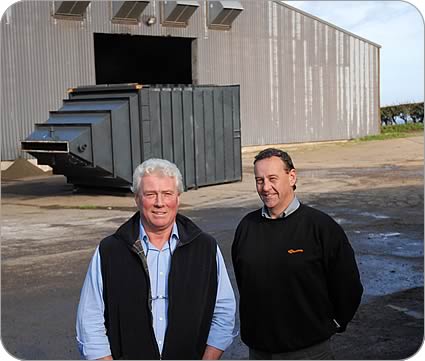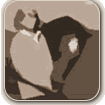Jennifer MacKenzie is an agricultural photo journalist with almost 30 year's experience. Operating from her base in Cumbria, Jennifer undertakes mainly industry-related freelance writing and photography.
Northumbrian Organic Feeds
Northumberland farmer Stuart Hyslop’s enthusiasm for the future of organic livestock and arable production has led to the development of the northern counties’ first fully organic blending and milling plant.
 |
| Stuart Hyslop |
Stuart Hyslop and his wife Wendy over the past five years have been building up a sizeable organic production unit within their diverse range of farming operations near Belford, predominantly producing organic lamb and beef and through Dawn Meats, supplying Marks & Spencer and ASDA.
Now, with demand for specialist feeds from the increasing number of north livestock producers who are converting to organic production – as well as more arable farmers in the region converting their production to organic – the Hyslops have taken the opportunity to start a new business, Northumbrian Organic Feeds.
This winter the aim is to sell around 2,000 tonnes of three 100 pc organic blended feeds for beef cattle and sheep from the Hyslop’s Easington Farm which along with their other holdings totals 3,500 acres.
By 2007 extensive buildings formerly used as potato store at Easington will also incorporate a milling and pelleting plant to complement the current crushing, mixing and weighing equipment producing the blends, all certified under Organic Farmers and Growers.
The £300,000 investment, whose nearest all-organic plant in the north is believed to be in Derbyshire, will meet not only the increase in demand for organic feeds but also tighter regulations which come into force in 2008 initially preventing organic beef and sheep producers and eventually all livestock and poultry farmers from using feeds which are not totally organic.
The investment has attracted a 30 per cent Defra Processing and Marketing grant the application for which was put together by Louis Fell, of George F White.
“We began our organic conversion at Wrangham Farm, Lowick in 1999, following with Birchwood Hall, Newham Buildings and Roughlees in 2000. In 2004 we bought Easington Farm and immediately entered it into organic conversion,” said Stuart Hyslop.
“Originally, my idea with blending and milling was to add value to our own production – we grow between 800 and 1,000 acres of arable crops, mainly wheat and beans.
“We need feed for our own livestock enterprise but I also felt there would be demand locally because of the number of livestock farmers converting to organic production. There is also more interest from arable farmers which has led to Coastal Grains investing in an organic store at Belford which I use. This all cuts down on food miles which are of course a current debate.”
With help from Alex Haywood of the Northumbria Organic Producers, Stuart sent out a survey to all the organic producers in the North East and some very positive responses came back.
Most were struggling to find reasonably priced organic feed in the area. “Once we had these responses back, I knew that there was a demand for an organic mill in the area and Easington seemed the ideal location, he said.”
To test the demand, last winter around 400 tonnes of blended feed were sold. This winter’s target will use around 60 per cent of the home-produced arable crops, supplemented by bought in beans because of a poor year generally for bean crops as well as barley and oats to make up a shortfall.
Some of the production will be used for the Hyslops’ own 100-cow suckler herd and 300 Angus cross and Charolais cross cattle which are finished each year, as well as around 2,500 ewes producing their own replacements from a hill flock and finishing 5,000 Suffolk cross and Texel cross lambs over 11 months of the year, 2,000 of which are bought-in. All are sold through Dawn Meats in Bridlington.
Depending on market fluctuations, Mr Hyslop says the retail mark-up on his arable crops without deducting production costs is between 20 and 30 per cent of commodity prices.
However, because feeds are primarily intended for local use – and raw ingredients are mainly sourced from within the area – retail prices are very competitive. Buyers have the opportunity to further contain costs by collecting feeds themselves instead of bulk or bagged delivery.
The demand particularly from organic sheep producers has led to the second phase of feed production, the milling and pelleting plant.
“There is a requirement from producers who feed sheep mechanically for rolls which can be fed on the ground with no waste so we will be adding a pelleted range to our current three blends which vary on protein content by next winter. We can also produce specialised blends to order,” said Mr Hyslop.
 |
| Stuart Hyslop with Robin Scott outside the buildings at Easington, with some of the equipment for the milling plant. |
The new business has led to the employment of a full-time sales and marketing man, Robin Scott, who has had 25 years’ experience in the livestock feed business.
Stuart Hyslop admits that originally the attraction of organic conversion of the farming operation was the financial benefits.
“I’m totally ‘converted’ myself to the system now which is a return to much more traditional farming methods. The benefits are as much from the reduced working capital outlay and input costs, particularly on the arable side, to the premium you are receiving from the commodity,” he said.
“There is a good margin between conventional and organic prices for cattle and arable crops so you can be making more money by producing a premium, added-value product which is still in a growing market.
“We haven’t encountered disease in our livestock or disease and weed problems in our arable crops. In fact, we have found our arable crops are less prone to changes in the weather and seasons and are naturally more resilient.
“The arable cropping with clover breaks is ideally suited to the type of mixed livestock systems we have in Northumberland.”
Another benefit in conversion for the Hyslops was that Easington suited Higher Level Stewardship as there are rare Whinsill grasslands - a primary target for DEFRA.
Louis Fell said: “The new HLS options fit nicely with the type of farming Stuart wanted to achieve at Easington. The Whinsill is a primary feature and through grazing restrictions, we are aiming to increase the biodiversity of the site and the grassland species.
“The area is also a tree sparrow hotspot and the rotational wild bird plots, grass margins and undersown spring crops will help provide habitats for these birds top thrive in.”
The Higher Level Stewardship scheme will also help fund the clearing of the scrub from the Whinsill and protect an ancient iron age settlement near the farm steading. Stuart and Wendy have also agreed to allow permissive access along the Whinsill so other people can benefit from this valuable landscape feature.

